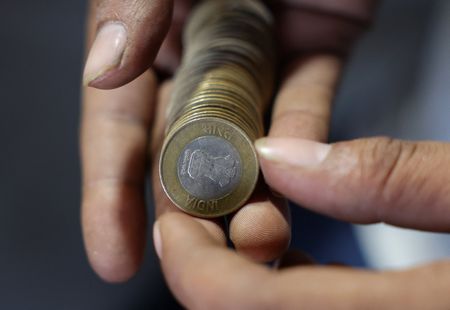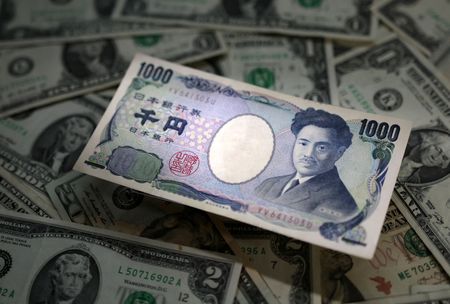By Jaspreet Kalra
MUMBAI, October 3 (Reuters) -The Indian rupee was pinned near its all-time low on Friday, weighed down by routine dollar demand from importers, which blunted the impact of modest portfolio inflows, with traders also flagging mild dollar sales from state-run banks.
The rupee was at 88.7625 against the U.S. dollar as of 10:10 a.m. IST, down 0.1% from its close at 88.69 in the previous session.
The currency hit a record low of 88.80 earlier this week, while traders pointed out that frequent market interventions by the Reserve Bank of India helped the rupee avoid steeper losses.
On the day, though, mild dollar sales from foreign banks helped cushion the ongoing pressure on the local currency, a trader at a Mumbai-based bank said.
There are intermittent offers from state-run banks as well, and given the RBI’s defence of 88.80 over recent sessions, traders may hesitate taking wagers against the rupee at these levels, the trader added.
India’s benchmark equity indexes, the BSE Sensex and Nifty 50 were down about 0.1% each, while the yield on the 10-year benchmark government bond was down slightly at 6.508%. [.BO] [IN/]
Even though local equities continued to be troubled by foreign outflows, government bonds have seen inflows.
Foreign investors net bought around $2.40 billion of bonds under the fully accessible route in the July-September quarter, according to clearing house data. In the same time frame, they sold over $8.5 billion of local stocks.
Elsewhere, the dollar was steady against a basket of major currencies but was on course for a weekly decline. Money markets are nearly fully pricing in a 25-basis-point cut by the Federal Reserve next month, according to CME’s FedWatch tool.
A U.S. government shut down has halted the publication of key economic data, including the closely watched monthly jobs report for September that was scheduled to be released on Friday.
“Despite the US government shutdown, a likely delay of US payrolls release today, and Trump’s threats to fire more Federal workers, markets have stayed remarkably resilient,” analysts at DBS said in a note.
(Reporting by Jaspreet Kalra; Editing by Eileen Soreng)











